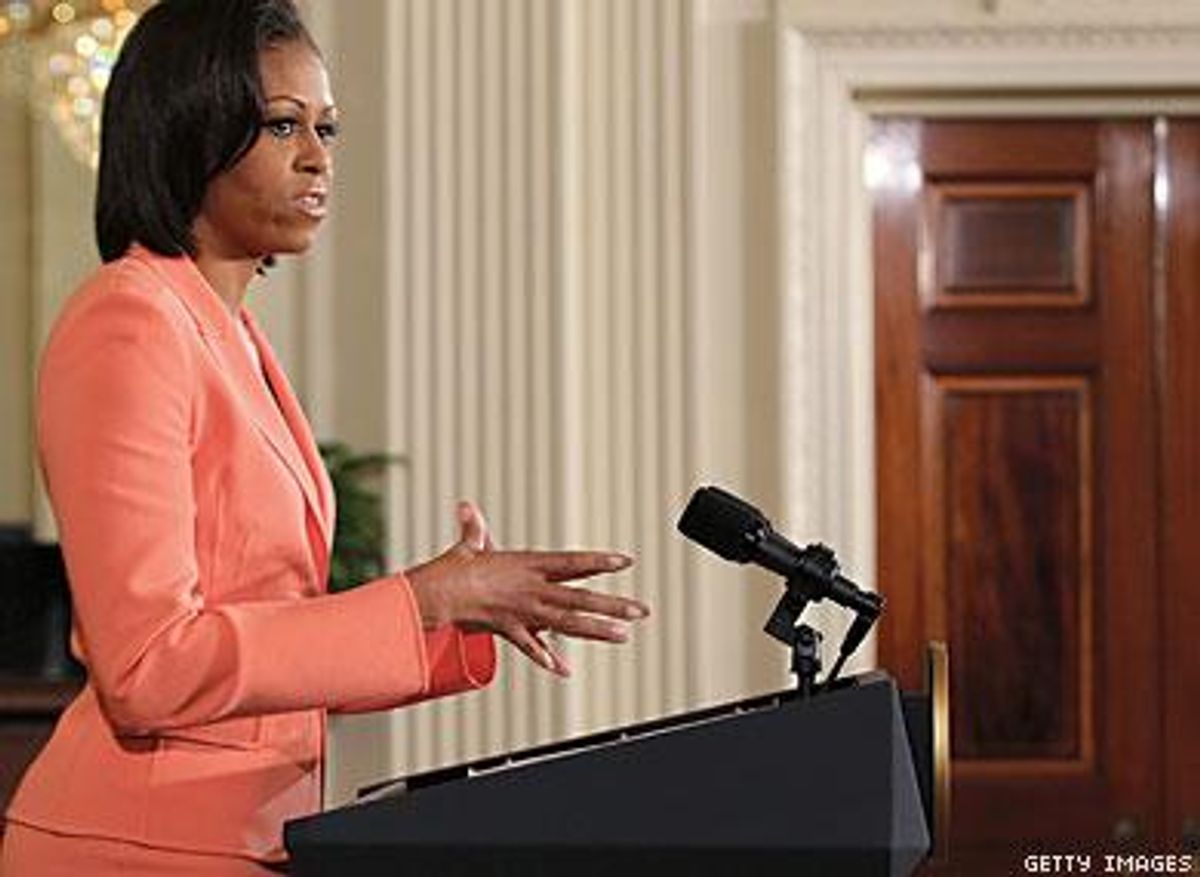
CONTACTStaffCAREER OPPORTUNITIESADVERTISE WITH USPRIVACY POLICYPRIVACY PREFERENCESTERMS OF USELEGAL NOTICE
© 2024 Pride Publishing Inc.
All Rights reserved
All Rights reserved
By continuing to use our site, you agree to our Private Policy and Terms of Use.
Few events in this country rival the pomp and circumstance of those held in the White House's East Room. As the last of the cherry blossoms fell in D.C. this spring, military leaders mingled with the likes of Arianna Huffington and Tom Brokaw as a pianist in uniform played languid jazz numbers on a 1938 Steinway concert grand piano. They had converged for the launch of Joining Forces, first lady Michelle Obama's and Jill Biden's broad initiative to bring awareness and support to military families, many who are burdened by multiple deployments in the ongoing wars in Iraq and Afghanistan.
"Jill and I truly believe that if enough people across this great country realize just how much our military families do for us and if we look in our own lives to see what we can offer, then there is absolutely no limit to what we can do together to keep these families and our country strong," Mrs. Obama told the guests after remarks from the president.
Though undeniably laudable in its goals, Joining Forces inadvertently highlighted the plight of some military spouses, which the White House was unwilling to address: Advocates for gay military spouses and families, who shoulder unique and unquestionably significant challenges, were not invited to the East Room kickoff. A spokeswoman for Mrs. Obama made clear that concerns for gay military families would indeed be addressed once "don't ask, don't tell" was no longer the law of the land. Repeal certification is expected in early fall. That did little to assuage many in the movement who felt a symbolic opportunity had been squandered. But the White House gaffe also illuminates just how uncharted the post-DADT territory is when it comes to supporting the partners and families of gay service members. Same-sex partners of those in the armed forces are barred from accessing vital benefits, such as health care, as the result of the Defense of Marriage Act, the 1996 law now being challenged in multiple lawsuits as well as House and Senate repeal bills. (The House Republican leadership, however, intends to defend DOMA after the Obama administration declared earlier this year that it would not.)
One man, whose partner is an active-duty service member, says the slights against people like him are wide-ranging, including even simple access to commissaries. "At the moment, I can't even buy a stamp on base," says David (he asked that his last name not be used). "That's pretty sad. Our primary interest is just being treated the same as other military families. We're not looking for anything novel beyond that."
How the Pentagon seeks to find solutions that will put gay spouses on equal footing remains to be seen. "To be a partner of an active military person is an amazing thing--it's a pride-filling endeavor," David says. "We have made it work for a long time without any assistance. But we will not be invisible."
From our Sponsors
Most Popular
18 of the most batsh*t things N.C. Republican governor candidate Mark Robinson has said
October 30 2024 11:06 AM
True
After 20 years, and after tonight, Obama will no longer be the Democrats' top star
August 20 2024 12:28 PM
Trump ally Laura Loomer goes after Lindsey Graham: ‘We all know you’re gay’
September 13 2024 2:28 PM
60 wild photos from Folsom Street East that prove New York City knows how to play
June 21 2024 12:25 PM
Melania Trump cashed six-figure check to speak to gay Republicans at Mar-a-Lago
August 16 2024 5:57 PM
Latest Stories
California's first state-wide LGBTQ+ senior survey shows mixed experiences
November 29 2024 1:27 PM
How Prim 'N Poppin' is providing beauty and activism in a conservative America
November 29 2024 12:30 PM
14 transgender elected officials you should know
November 29 2024 11:11 AM
Himbo Timmy Hilton says he's ready to find his love daddy on 'For the Love of DILFs'
November 29 2024 10:35 AM
25 problematic gay characters we can't help but love
November 29 2024 10:10 AM
Discover the LGBTQ+ paradise of San Juan, Puerto Rico
November 29 2024 9:30 AM
President Biden to host AIDS Memorial Quilt on White House South Lawn for World AIDS Day (exclusive)
November 29 2024 9:30 AM
Evan Rachel Wood prevails in Marilyn Manson defamation case
November 28 2024 5:51 PM
11 queer moments in Macy's Thanksgiving Day Parade history
November 28 2024 12:16 PM
Jonathan Bailey shot 'Wicked,' 'Fellow Travelers' & 'Bridgerton' at same time
November 28 2024 12:10 PM
The confessions of a retired gas-lighter
November 28 2024 11:00 AM
Thanksgiving dessert: 25 mouthwatering artworks from Tom of Finland Fest
November 28 2024 9:00 AM
Being grateful for the L, the G, the B, the T, the Q, and the + this year
November 28 2024 8:00 AM
Instead of reporting on actual news, the New York Times goes after trans people again
November 27 2024 4:42 PM
Federal government eases rules on organ transplants between donors and recipients with HIV
November 27 2024 4:12 PM
The controversy over a trans woman volleyball player at San Jose State, explained
November 27 2024 4:05 PM
How bathroom bans on federal property would impact trans Americans
November 27 2024 1:32 PM
Ohio Gov. DeWine signs anti-trans school bathroom law
November 27 2024 1:01 PM
Zooey Zephyr calls on trans people to 'plant the flag of joy' against Donald Trump (exclusive)
November 27 2024 11:49 AM

















































































